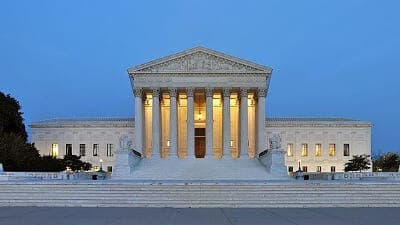SCOTUS case will have a big impact on robocalls
There’s a landmark case before the Supreme Court of the United States regarding autodialers and robocalls. Twenty-one members of the U.S. Congress have recently joined to file an amici brief on the case. Here’s a review of the pending case and what this brief adds.
The TCPA
In the 1980s, new computer-driven telemarketing tools had caused the number of unsolicited telemarketing calls to increase markedly. The Telephone Consumer Protection Act of 1991 (TCPA) was enacted to address live unsolicited commercial telemarketing to residential subscribers.
The TCPA includes a definition of an Automatic Telephone Dialing System (ATDS), or “autodialer:”
(1) The term ‘automatic telephone dialing system’ means equipment which has the capacity —
(A) to store or produce telephone numbers to be called, using a random or sequential number generator; and
(B) to dial such numbers.

Court decisions
In court cases brought against high-volume callers using autodialers, defense attorneys have questioned the definition of ATDS as a tactic to argue that the definition did not apply to their client.
From these cases, two different interpretations of this the ATDS definition have emerged from court decisions:
- Expansive. Neither a random number generator nor a sequential number generator is required. The autodialer merely has the capacity to store numbers to be called and dial them.
- Narrow. The autodialer must have the capacity of using a random or sequential number generator to store or produce the numbers to be dialed.
Note that, with the narrow interpretation, an autodialer that does not use a random or sequential number generator is not an ATDS. Robocalling actors that use such a system would not be subject to the TCPA.
The pending case before the Supreme Court
Since there have been different interpretations found in different court cases, the U.S. Supreme Court has agreed to hear one of the cases, Facebook v. Duguid, to make a decisive finding and resolve the ambiguity.
Twenty-one Congressional representatives joined in this brief amici curiae
Amicus curiae (“friend of the court”) is a person who is not a party to the case who assists a court by offering information, expertise, or insight that is relevant to the case.
Twenty-one legislators filed this amici curiae, including Senator Ed Markey, who was an author of the TCPA.
In this brief, _("amici")_, argue that the broader, more expansive definition of ATDS is appropriate, not the narrower definition that some courts have found.
Specifically, the brief explains that Congress defined ATDS to include:
- Systems like predictive dialers that dial telephone numbers stored in a list or database (the “store” prong) and
- Systems that dial arbitrary numbers produced by a random or sequential number generator (the “produce” prong).
The definition of ATDS is written in the disjunctive—its plain language encompasses systems that automatically dial telephone numbers after either storing those telephone numbers to be called (the “store” prong) or producing those telephone numbers to be called using a random or sequential number generator (the “produce” prong).
The amici argue this claim in two ways:
- They cite testimony from hearings on the TCPA while the legislation was under consideration. Testimony indicated that Congress was aware that only some automatic dialers generated random numbers while others dial numbers stored in a list.
- They point out a logical failure if the ATDS definition required a random or sequential number generator:
- A consent defense for ATDS calls serves little purpose if the only systems regulated by the ATDS provision are those that dial telephone numbers generated out of thin air.
- Robocalling users of those systems could only ever establish a consent defense through sheer dumb luck because they are, by definition, calling completely arbitrary telephone numbers.
- The only conceivable way for callers using automated systems to ensure they call telephone numbers with consent is to use a targeted list of telephone numbers believed to have consent.
- But, of course, if they do that, then they are not using an ATDS in the first place, and thus have no need for a consent defense.
The TCPA exception for calls made to consenting recipients implies that the autodialer ban applies to stored-number systems as well as systems that generate numbers to be called.
Therefore, the amici requested that the Court affirm Duguid v. Facebook.
List of amici curiae
Sen. Edward J. Markey (D-Mass.)
Sen. Robert Menendez (D-N.J.)
Sen. Ben Cardin (D-Md.)
Sen. Jeff Merkley (D-Ore.)
Sen. Richard Blumenthal (D-Conn.)
Sen. Elizabeth Warren (D-Mass)
Sen. Tammy Baldwin (D-Wisc.)
Sen. Sheldon Whitehouse (D-R.I.)
Sen. Ron Wyden (D-Ore.)
Sen. Sherrod Brown (D-OH)
Sen. Tom Carper (D-Del.)
Rep. Anna G. Eshoo (CA-18)
Rep. Doris Matsui (CA-06)
Rep. Tony Cárdenas (CA-29)
Rep. Jerry McNerney (CA-09)
Rep. Jackie Speier (CA-14)
Rep. Jamie Raskin (MD-08)
Rep. Alcee L. Hastings (FL-20)
Rep. Ed Case (HI-01)
Rep. Bobby L. Rush (IL-01)
Rep. Marc A. Veasey (TX-33)
TransNexus solutions
We offer robocall prevention solutions in our ClearIP and NexOSS software platforms. Contact us today to learn how you can prevent inbound robocalls from disrupting your subscribers and mitigate the origination of outbound robocalls to comply with the TRACED Act.
TransNexus has a comprehensive suite of robocall mitigation solutions to prevent the origination of unlawful robocalls.
Learn more about robocall mitigation